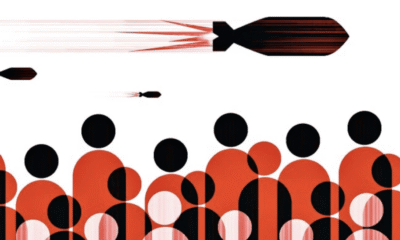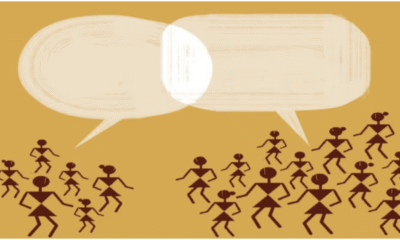
|
Getting your Trinity Audio player ready...
|
(The article was originally published by Indian Express on August 19, 2023 as a part of Dr Madhav’s column titled ‘Ram Rajya’. Views expressed are personal.)
In 2001, the global economics research head for Goldman Sachs, Terence James O’Neill, popularly known as Jim O’Neill, authored a paper titled, ‘The world needs better economic BRICs’. He predicted that the four emerging economies — Brazil, Russia, India and China — would register GDP growth that “would have important implications for global governance arrangements”. For O’Neill, who went on to become Treasury Secretary in the UK Government, it was essentially a marketing ploy to direct investments into these countries.
That acronym, BRIC, gained political traction when the foreign ministers of Brazil, Russia, India and China met on the sidelines of the UN general assembly in 2006. The Russian President, Vladimir Putin took the lead in hosting a summit of BRIC countries at Yekaterinburg in 2009. In 2010, South Africa was also invited to join the group, and the economic idea of BRIC turned into a political bloc called BRICS.
Pundits dismissed it initially as an incompatible group with the least number of common denominators among members. But, as the group prepares to host its 15th annual summit on August 22-24 at Johannesburg in South Africa, their attitude has changed from dismissal to concern. The developing world, in contrast, is showing eagerness to join the group.
This indicates the growing clout of BRICS. The subservience of multilateral financial institutions to the Western political-economic agenda has been causing serious unease in the developing world, which found in the BRICS bank — the New Development Bank — a viable alternative. The NDB was started in 2014 with an initial capital investment of $10 billion from each of the five member countries. Headquartered in Shanghai, it soon started drawing the attention of several developing countries as an easy-to-access aid-giving institution. Countries like Bangladesh, the UAE, Uruguay and Egypt picked up smaller stakes in it in 2021.
The unease in the Western politico-economic ecosystem over the rise of BRICS is palpable. On August 3, Reuters flashed unsubstantiated news with the headline “India’s Modi unlikely to travel to South Africa for BRICS summit, sources say”. Twenty-four hours later, the same agency carried another news item, quoting official sources, that “India PM Modi to travel to South Africa for BRICS summit”.
Several news items started appearing in the Western media speculating about a Narendra Modi– Xi Jinping meeting and the possibility of an India-China stand-off disrupting the BRICS summit.
“China and India are at odds over BRICS expansion”, a prestigious US think tank declared, prompting the Indian foreign ministry spokesperson to clarify that there was no truth in that.
Meanwhile, in March, the International Criminal Court declared Putin a war criminal for some actions in Ukraine. South Africa is a signatory to the ICC charter. That mandates it to arrest Putin in case he steps on its soil. Some Russian agencies suggested that any such step would be deemed an act of war. However, the Russian leadership wisely realised that it would be a public relations disaster to allow this “war criminal” debate to go on, and announced on July 19 that Putin would be attending the summit virtually.
Perturbed by these developments, the South African foreign minister Naledi Pandor publicly alleged that “someone… is trying to spoil our summit… creating all sorts of stories”.
Many see the BRICS as a competitor to G-7. Its share of the global GDP in PPP terms stands at 31.67 per cent, while that of G-7 is at 30.31 per cent. BRICS countries today talk about an alternative payment system and a new reserve currency.
More and more countries are showing eagerness to join BRICS, including Saudi Arabia, UAE, Egypt, Algeria and Argentina. The South African foreign minister said that there were at least a dozen request letters already lying on her table. This is a result of the developing world’s growing aversion to the IMF’s regulatory style. Aid-seeking countries sometimes face harsh regulations from the Bretton Woods institutions, which include human rights and LGBTQ+ rights issues. Such issues are far beyond the economic mandate and also go against the cultural ethos of many recipient nations.
Some BRICS members see an opportunity to position the group as anti-West. China, in particular, seems keen on using this forum to expand its influence. Angered by the West’s incessant attacks, Putin wants de-dollarisation to become the principal objective of the BRICS agenda.
Countries like India, South Africa and Brazil need to do a balancing act on BRICS’ agenda. There is no denying the fact that global multilateral economic infrastructure calls for serious reform. With more than 30 per cent share of the global GDP, BRICS nations don’t have more than 15 per cent say in institutions like the IMF. However, in the reform versus replace battle, India must give preference to making BRICS a catalyst for reformed multilateralism.
BRICS is being increasingly seen as the voice of the Global South. Prime Minister Modi is championing the cause of the Global South on multilateral forums. As the chair of G-20, he called upon the G-20 leaders to make the 55-country African Union a member of the group.
By inviting 49 heads of African nations to the BRICS summit, the president of South Africa, Cyril Ramaphosa has also thrown his hat in the ring for leadership of the Global South. India, South Africa and Brazil can take the lead in representing countries of the Global South in persuading developed nations to accept the new global reality of multipolarity and appreciate the need for building more inclusive democratic structures in the multilateral arena.
The narrative that BRICS is an adversary of G-7 is fraught with the danger of setting the stage for a new Cold War in the name of the Global South versus the Global North. That should be averted. Jim O’Neill’s proposition — “What the world really needs is… a genuinely representative global economic governance” — should be the guiding spirit for the BRICS leadership.




